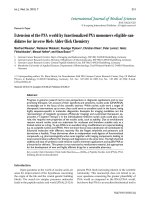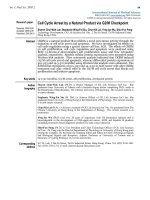PAC CLERK ATTACHEMENT UGANDA by Bame Letsatle
Bạn đang xem bản rút gọn của tài liệu. Xem và tải ngay bản đầy đủ của tài liệu tại đây (2.01 MB, 14 trang )
SADCOPAC CLERK ATTACHMENT
REPORT
By: Ms Bame Letsatle
Public Accounts Committee Clerk - Botswana
SADCOPAC CLERK
ATTACHMENT
Acknowledgement
On behalf of all PAC Clerks in the region, I would like to express my sincere
gratitude and appreciation to the World Bank and GIZ all persons who assisted me
to fulfil the objectives of this programme. I would like to thank particularly the
Parliament of Uganda for hosting me in their Parliament, for providing such
information and clarifications, and it is my hope that we shall continue to receive
similar measures of assistance and cooperation from them to ensure that the
SADCOPAC initiatives are implemented.
In addition I would like to thank the Uganda PAC Secretariat for the invaluable
assistance rendered throughout the duration of the programme as well as in the
compilation of this report.
1) Introduction
Duration of the Attachment
The SADCOPAC Clerk Attachment started from 16th October 2013 to 1st
November 2013. The aim of the attachment programme was to gain first-hand
experience from other PAC Clerks and possibly see the practical procedures
and processes and how they deal with the challenges they face on their daily
duties.
Observations
I spent most of the time observing the Uganda PAC examination.
Parliamentary scrutiny of resources use by Government is carried out by the
Public Accounts Committee via the oversight or accountability functions. By
the rules of Procedure of Parliament, the Leadership of the Uganda PAC is
vested in the Official Opposition. The committee is currently chaired by Hon
Kassiano Wadri Ezati, MP.
The Uganda PAC is established by the Constitution which provides powers
and functions of Committee and it is specifically provided for under Rule
No.148 of the Rules of Procedure. The Committee is comprised of twenty eight
(28) Members of which sixteen (16) are from the ruling party.
PAC EXAMINATION
PAC EXAMINATION cont..
Uganda PAC is mandated to examine the audited accounts showing the
appropriation of the sums granted by Parliament to meet the public
expenditure of government.
During the PAC examinations the following are always present to assist the
Committee:
Auditor General – The work of PAC originates from the Office of the AG. The
AG answers clarification questions.
PAC EXAMINATION cont..
The Researchers do possible questions concerning the queries. The Team
discusses with the Chairperson and the Members of the Committee key issues
prior to the meeting.
Legal Counsel – Puts out queries.
Four Officers from Criminal Investigation Department (CID).
PAC secretariat - The drafting of the PAC report is done by the PAC secretariat.
PAC EXAMINATION cont..
The PAC secretariat then gives the draft report to the Chairperson, and if he
Okays it becomes the Chairperson’s draft report. The draft report is debated
during the PAC meeting, where any changes can be proposed, and accepted
or rejected.
The findings, observations and recommendations are captured by the Legal
Counsel and the PAC secretariat during the meeting and the rest of the
recommendations are done by the Members.
PAC compiles a report containing recommendations, which is then submitted
to the House for consideration and adoption. Once the recommendations are
adopted by the House, they are referred to the Executive for implementation.
Within six months, the Executive is obligated to report the action taken on the
recommendations of PAC/Parliament in the form of a report, called Treasury
Memorandum. The Treasury Memorandum is by law supposed to be audited
by the Auditor General, who in turn, reports to Parliament on his findings.
PAC EXAMINATION cont..
The Lead Counsel is a Senior Member of the Committee with wide experience in
the operation of Government and always liaises with the Auditor General so as to
be brought on board.
I had an opportunity to observe the PAC examinations. Though there was a huge
backlog of Auditor General’s reports that have not yet been examined by the
Committee, the examinations were concluded well on the scheduled time.
2) ISSUES
OBJECTIVES OF SADCOPAC
This paper is dedicated to identifying what might be referred to as “best
practices” of PAC Clerks, based on comparative experience.
The issue of what exactly constitutes “best practices” is not always
evident. Much depends on institutional settings, needs and contexts
that can vary considerably between countries.
ISSUES cont…..
The objectives of the PAC Clerk attachment programme were as follows:
Writing a good report in a short time.
Relationship of PAC towards the media, civil society organizations and the public at
large, particularly in relation to parliamentary hearings.
Unclear job descriptions.
Members don’t read their documents.
Role of a PAC clerk.
Distribution of committee work schedule.
Staffing norms.
Confidentiality, Ethics and Non Partisanship
Role of Treasury Board
Parliamentary Procedure
Parliamentary Committees
Office of Protocol
ISSUES cont…..
After the attachment one should share the experiences they gained from the
host Parliament. Sharing of the information could be done through the wiki,
email and during PAC Clerk training workshops/conferences.
PAC Clerk attachment is of critical importance in matters of oversight and
good governance and it is important that the project is effectively managed for
all concerned parties to benefit. After attachment one will be able to:
Obtain fresh ideas from fellow Clerks that can be used to meet both short
term and long term manpower needs so as to promote the positive image
of individual Parliaments.
a) Role of a PAC clerk.
Appropriate staffing is essential if parliamentary committees are to function
effectively.
Committees often need different categories of staff if they are to achieve their
optimum best. Parliamentary Committees often need staff to assist with
procedural issues, administrative matters, assist with drafting bills, and
provide expert opinion and analysis on major policy issues. They need clerks,
researchers, legislative reporters, legal draftsmen, and other support staff.
Committees are managed by committee clerks who give procedural advice to
the committee; take minutes of the committee meetings; receive and store
documents on behalf of committees; and carry out administrative duties. They
also assist in recordkeeping, arranging witnesses, advising members on
procedures, In essence the committee clerk is responsible for coordinating
affairs and ensuring that the committee chairperson and members have the
needed support to be effective.
b) Parliamentary Committees
The mandate and the functions of committees are often clearly stated in the
national Constitution and in the rules of orders that govern the functioning of the
parliament.
Generally, committees have the power to take evidence or call for documents;
send for persons, papers, and records. Committees also have the power to
regulate their own procedure within the mandate of the parliament as a whole.
CONCLUSION
Committees are managed by committee clerks who give procedural advice to
the Committee. It is the responsibility of the Committee Clerk to coordinate all
the activities of the Committee and ensure that the Members are given the
necessary assistance they require, hence it is critical to continually train them
to enhance their knowledge.









